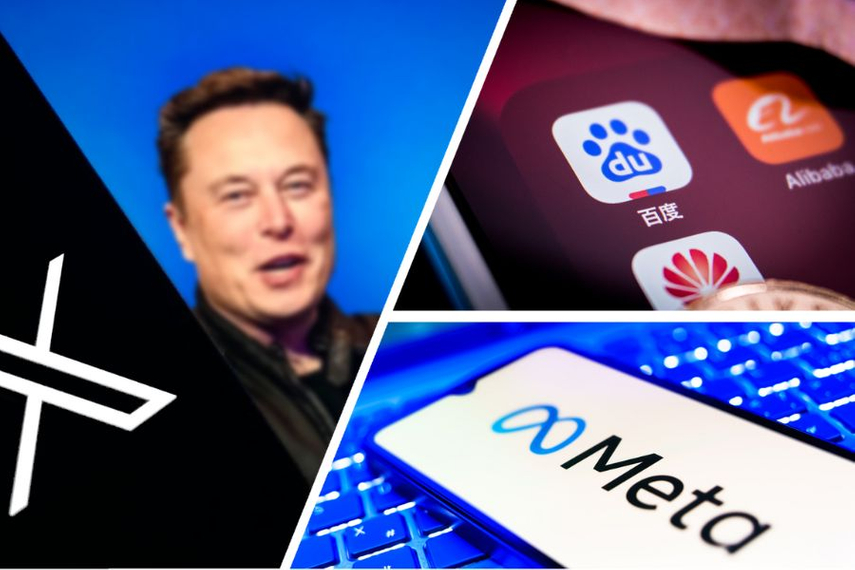
The reverberations of last week's US election continue to cascade through the corridors of Silicon Valley and beyond. As Trump's incoming administration takes shape—most notably with Elon Musk's appointment to spearhead government efficiency—we're witnessing an unprecedented dissolution of the already tenuous boundary between big tech and political power—with the entanglement evolving from mere intersection to complete intertwinement.
This fallout is perhaps (and unsurprisingly), most starkly illustrated on X, which has emerged as the hotbed of tech's political cobweb.The Guardian's announcement this week that it would cease posting content on the platform—abandoning an audience of 27 million followers across 80 accounts—represents more than just another media exit. It's a signal to a clear stance that principles trump profit (no pun intended), even at the cost of significant reach. Yet the simultaneously reported return of entertainment giants Disney, Comcast, IBM, and Warner Bros. Discovery tells a different story. Their cautious re-engagement, with spending slashed from $170 million to just $3.3 million year-over-year (according to Media Radar), suggests an attempt to balance moral considerations with market presence. Perhaps most telling is the rise of challenger brands like Karma Shopping and Canles Shoes, each investing over $12 million—newcomers seemingly less encumbered by reputational concerns, spotting opportunity in established brands' hesitancy.
At the heart of these shifting allegiances seems to lie a fundamental crisis of trust. As platforms increasingly align with political agendas and powerful figures, brands face an existential question: Does platform presence equate to tacit endorsement of its politics? For consumers, the question is equally prickly: Can they trust information from platforms where political discourse and corporate interests are so deeply intertwined? X's paradoxical metrics—its largest user exodus since Musk's acquisition occurring alongside record traffic of 46.5 million visits—suggest a consumer and brand landscape simultaneously hemorrhaging confidence while trying to maintain its grip on public discourse.
Meta's mounting challenges only amplify such concerns. Just fined $840 million by the European Union over classified ads violations and 'abusive marketplace practices', coupled with its US antitrust trial over Instagram and WhatsApp acquisitions, these recent events speak to a deeper unease about how tech giants wield their power. For Asia-Pacific markets, where Meta's practices are currently facing similar scrutiny in Australia, these developments signal a potential shift in how tech giants can operate globally. The implications reach beyond mere regulatory compliance—they touch on questions of data sovereignty, platform power, and ultimately, user trust.
Australia's bold proposition to restrict under-16s from social media access strikes at the very heart of this platform economics, following a trend of tightening regulation seen in markets like Canada's recent operational TikTok restrictions. These developments suggest a growing willingness globally to challenge the established mechanics of social platforms, particularly around youth engagement and data privacy. For brands and platforms alike, this regulatory momentum poses existential questions about audience targeting and advertising efficacy in markets where demographic access may become increasingly constrained by legislation.
However, against this backdrop of Western tech turmoil, Asian technology companies, namely in China, are seizing their moment with remarkable clarity of purpose.
This week's launch from Baidu of their AI-powered smart glasses arrives at a particularly pivotal time. The device, which intends to become a "private assistant" through the company's ERNIE generative AI technology, represents more than just a challenge to Meta's Ray-Ban collaboration, many are seeing it as a pivot to China's readiness to compete in consumer AI hardware.

The timing also aligns with broader moves across China's tech sector. As OpenAI announces plans for both its January 2025 launch of the "Operator" AI agent, it enters a market where Chinese firms are already demonstrating their AI leadership. Alibaba's AI translation platform, which has been serving 500,000 merchants across 15 languages, is reportedly outperforming similar products from Google, DeepL, and ChatGPT. While OpenAI's choice of Singapore for its second office underscores the growing strategic importance of the Asian market, it also highlights a shifting reality: The region's tech firms are no longer playing catch-up—they're also setting the pace.
Looking ahead
Trump's proposed tariffs (up to 60% in some cases) could prove to be the unexpected accelerant to this tech reformation. Rather than hampering Chinese innovation, these trade barriers might catalyse an even more decisive pivot toward regional tech independence.
This rise of robust Asian alternatives to Western tech giants could also reshape the digital landscape in ways that ultimately benefit both consumers and brands. As companies like Alibaba and Baidu continue to innovate and scale, they're creating genuine competition in a space long dominated by Silicon Valley. For consumers, this could mean access to a wider array of services better tailored to regional needs and preferences. For brands, the emergence of credible alternatives to Western platforms offers new opportunities to diversify their digital strategies and advertising spend, particularly crucial at a time when platform trust and political alignment have become critical considerations.
The future unfolding from this tumultuous period is unclear, however some key realities are emerging: Tech platforms can no longer pretend to be neutral spaces. As political and corporate and advertising interests become increasingly inseparable, organisations will find themselves navigating a complex landscape where every platform choice carries political weight. The winners in this new reality may well be those who can build and maintain trust—whether through clear ethical stances like The Guardian's, or through the development of alternatives that prioritise regional values and user privacy. For Asia, this moment could mark the beginning of a significant tech renaissance, one built on the foundation of credibility rather than just technological capability.


.jpg&h=334&w=500&q=100&v=20250320&c=1)


.png&h=334&w=500&q=100&v=20250320&c=1)





.png&h=334&w=500&q=100&v=20250320&c=1)
.jpg&h=268&w=401&q=100&v=20250320&c=1)
.jpg&h=268&w=401&q=100&v=20250320&c=1)
.jpg&h=268&w=401&q=100&v=20250320&c=1)




